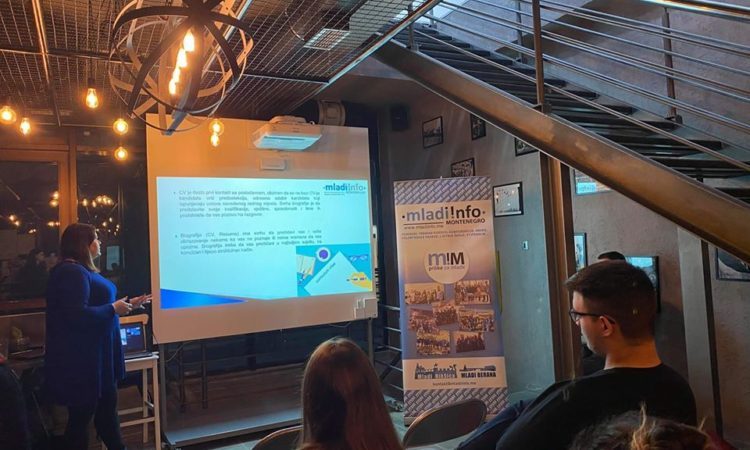The NGO “Mladiinfo Montenegro” held a workshop on writing a biography in the Mtel digital factory on February 18, 2020.
Given that the CV is the first contact with the employer because it is used to pre-select candidates, namely the selection of candidates who meet the requirements for the job, it is very important that the work experience is presented in writing form accurately, concisely and with quality to leave good impression. The aim of the workshop was to inform everyone present about the correct preparation of biography (CV), how to present yourself when applying for a job, competitions for student exchange, volunteering and the similar. The purpose of biography is to present yourself in the best possible light and thus stand out from the competition. The participants of the workshop were introduced to how to write a good CV, which will be useful for them in employment.
The president of Mladiinfo Montenegro, Milica Zugic, explained in detail the items that should be included in the biography (CV).
“Nowadays, all job advertisements and vacancies require you to send a CV and a motivation and / or cover letter, because that way employers can easily assess which candidates are suitable for a certain job. You should look at your CV as a marketing document, with the help of which you can “sell” your abilities and qualifications and get the job you want based on that. Writing a CV should be taken seriously. Take time just for that and don’t rush. Make writing a CV your main job, the first big step that leads you to the desired job. Do not think that no one will read your biography and that it is sent “for the sake of order”. When you apply for a job, the documents you send and most of all your CV, “speak” for you, represent you and if they do not do so in an acceptable way you will hardly get an invitation for an interview and the opportunity to present yourself in more detail. There are no mistakes and don’t expect your mistakes to come to an understanding. Most employers select candidates on the basis of received biographies first. This is your first and only chance to draw the attention of a potential employer to yourself and make him interested in hiring you. To be recognized as a serious candidate, it is not enough to have only the required qualifications, but also to present them in the best possible light to someone who does not know you at all. Therefore, writing a CV should be approached very seriously, paying attention to every detail of it”, explained Zugic. She said that every CV should contain some basic information about you.
“When it comes to personal data, they should state: name and surname, date of birth, contact phone number, e-mail, residential address and nationality. You can put your photo in the upper right part of the CV. Make sure the photo is serious and decent, it is best to use the one for the ID card. In formal education, it is important to emphasize which high school you graduated from, from when to when you attended it, which degree you hold. Emphasize the GPA in high school only if it is good and if you do not have a college degree. If you graduated from college, state the name of the college, the place where you studied, from when to when you studied, when and where you graduated. Indicate the GPA if it is representative. There is no need to list elementary school if you have completed secondary school or college. As part of non-formal education, you can list professional conferences and seminars in which you have participated, both in the country and abroad, as well as other courses you have attended. Indicate the periods of work in reverse chronological order, the full name of the institutions, the positions you have worked in and the experience gained. The job description must be adapted to the position you are applying for, emphasize the relevant experience. Indicate the languages you know and the level of knowledge (beginner, intermediate or advanced). Also, indicate if you have completed a language course, certificate and / or diploma as well as the institution where you acquired this knowledge. Keep in mind that the employer will easily check how well you know a foreign language and do not put yourself in a situation where you state in your CV that you know the language very well, and that you have a problem composing a sentence in an interview”, advised Zugic. If your biography seems cold and professional, she thinks, you can refresh it with the part about hobbies.
“However, choose those interests and hobbies that specifically indicate your qualities, for example, if you have been a member of a sports team for several years, state it in your biography because it testifies to your perseverance and team spirit. Be sure to mention if you have a driver’s license and you can mention if you own a car. To make your CV sound even better, omit private details, listen to other opinions about your resume, use the text of the ad for the job you are applying for, do not stop updating your CV, do not allow your CV to have grammatical errors. The information about the biography must be accurate, be careful when quoting professional words and terms whose meaning you do not know”, said Zugic.
Workshop participants had the opportunity to write a biography on their own and practically work on mistakes, if any. The workshop was attended by about 20 young people who expressed interest in other similar educations.






